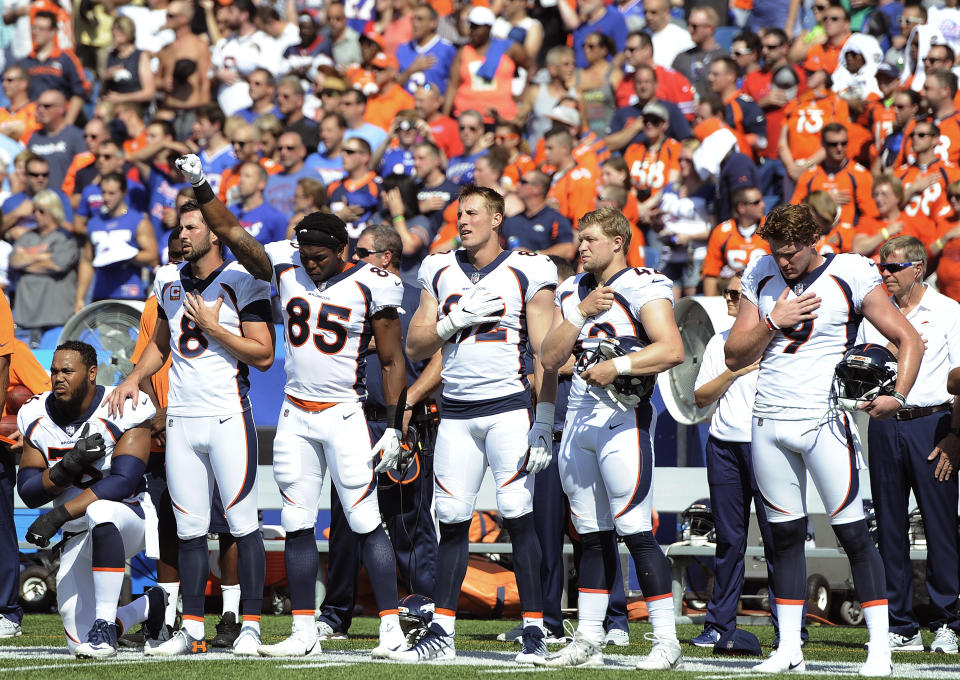Louisiana parish's ban on high school athletes protesting during anthem looks dubious

High schools teach the Constitution all over the nation, but now a parish in northwest Louisiana is walking right into a lesson in Supreme Court history. And it relates to on-field protests during the playing of the national anthem.
Bossier Parish school superintendent Scott Smith released a statement on Wednesday to a Louisiana community that includes the Barksdale Air Force Base, where President George W. Bush and close advisers flew on Air Force One after the terrorist attacks on Sept. 11, 2001.
“Freedom is not free,” Smith wrote. “Each day the men and women at Barksdale Air Force Base and in other branches of the military in Bossier Parish and throughout the nation don a uniform and put their lives at risk as they proudly serve and protect us with honor. The least Bossier Schools can do is expect our student athletes to stand in solidarity when the National Anthem is played at sporting events in honor of those sacrifices.”
Smith went on to state that principals and coaching staffs “have sole discretion in determining consequences should a student athlete elect not to stand during the National Anthem.”
On Thursday, Parkway High School principal Waylon Bates offered his own statement, which said in part: “Parkway High School requires students to stand in a respectful manner throughout the National Anthem during any sporting event in which their team is participating.”
Those who don’t comply, Bates wrote, will result in “loss of playing time and/or participation” and continued failure to comply will result in “removal from the team.”

This is an echo of President Donald Trump’s statement last week, in which he encouraged NFL owners to terminate a “son of a bitch” who protests during the national anthem. That comment created a firestorm on social media, a wave of protests before NFL games last weekend, and now a directive from a group of high schools.
The problem for Bossier Schools is another iconic symbol of America: the Constitution.
“The idea that the only thing you can do is stand, it’s a little bit authoritarian if you think about it,” says Mark Kende, director of the Constitutional Law Center at Drake University in Iowa.
Kende points to a Supreme Court case from 1969 in which a group of people in Des Moines decided to wear black armbands in protest of the Vietnam War. High school principals in the city found out about the plan and made a rule that any students who wore an armband to school would be asked to remove it and, if they refused, would be suspended. In the days after, three students wore armbands to school and were suspended. Their parents sued and the case went all the way to the Supreme Court, which sided with the students by a 7-2 margin.
In the majority opinion in Tinker v. Des Moines School District, Justice Abe Fortas wrote the following passage:
“The school officials banned and sought to punish petitioners for a silent, passive expression of opinion, unaccompanied by any disorder or disturbance on the part of petitioners. There is here no evidence whatever of petitioners’ interference, actual or nascent, with the schools’ work or of collision with the rights of other students to be secure and to be let alone. Accordingly, this case does not concern speech or action that intrudes upon the work of the schools or the rights of other students.”
The armband protests are similar to what Bossier Schools is trying to prevent. The pregame kneeling, originated last year by NFL quarterback Colin Kaepernick, consist of a “silent, passive expression of opinion, unaccompanied by any disorder or disturbance.”
Can the protests be seen as disruptive? Bates’ memo indicates so, as it concludes by expressing its “commitment to creating a positive environment that is free of disruption to the athletic contest or game.”
Yet it’s tough to argue convincingly that kneeling silently is a true disruption. And Fortas’ opinion eloquently responds to that exact argument in the Tinker case when he writes:
“… in our system, undifferentiated fear or apprehension of disturbance is not enough to overcome the right to freedom of expression. Any departure from absolute regimentation may cause trouble. Any variation from the majority’s opinion may inspire fear. Any word spoken, in class, in the lunchroom, or on the campus, that deviates from the views of another person may start an argument or cause a disturbance. But our Constitution says we must take this risk … and our history says that it is this sort of hazardous freedom – this kind of openness – that is the basis of our national strength and of the independence and vigor of Americans who grow up and live in this relatively permissive, often disputatious, society.”
The ability to express unpopular opinion, the justice wrote, is one of the most integral liberties we have.
“There is a disruption standard,” Kende says, “but it can’t be, ‘We don’t like what you’re doing.'”
Going back further in American history, to 1943, the Supreme Court ruled that members of the Jehovah’s Witnesses cannot be forced to salute the flag. Justice Robert Jackson famously wrote: “If there is any fixed star in our constitutional constellation, it is that no official, high or petty, can prescribe what shall be orthodox in politics, nationalism, religion, or other matters of opinion, or force citizens to confess by word or act their faith therein.”
The other Constitutional concern here is a “chilling effect,” in which a would-be protester shuts up out of fear of reprisal. The judicial branch warns against not only suppression of speech, but also the fear of suppression for speech. That appears to be in play in this case as well.
“Unless the students do something that is more than a peaceful expression,” Kende says, “the school has no power to discipline.”
(Multiple emails to the Bossier Parish superintendent’s office were not immediately returned.)
Later on Thursday, the Louisiana chapter of the ACLU chimed in: “Schools have no valid interest in turning their students into mouthpieces of government speech, full stop. Indeed, schools should respect students who embrace their constitutional rights and stand up to injustice -- not punish them.”
No doubt the people of Bossier Parish who support the superintendent’s statement feel a sense of patriotic duty. The question is whether it’s more important to defend the American flag or the Constitution.
More on anthem and protests at Yahoo Sports
